| Listing 1 - 10 of 13 | << page >> |
Sort by
|
Book
ISBN: 3110632446 311063242X 9783110632422 Year: 2019 Publisher: Berlin: de Gruyter,
Abstract | Keywords | Export | Availability | Bookmark
 Loading...
Loading...Choose an application
- Reference Manager
- EndNote
- RefWorks (Direct export to RefWorks)
Both compounds and multi-word expressions are complex lexical units, made up of at least two constituents. The most basic difference is that the former are morphological objects and the latter result from syntactic processes. However, the exact demarcation between compounds and multi-word expressions differs greatly from language to language and is often a matter of debate in and across languages. Similarly debated is whether and how these two different kinds of units complement or compete with each other. The volume presents an overview of compounds and multi-word expressions in a variety of European languages. Central questions that are discussed for each language concern the formal distinction between compounds and multi-word expressions, their formation and their status in lexicon and grammar. The volume contains chapters on German, English, Dutch, French, Italian, Spanish, Greek, Russian, Polish, Finnish, and Hungarian as well as a contrastive overview with a focus on German. It brings together insights from word-formation theory, phraseology and theory of grammar and aims to contribute to the understanding of the lexicon, both from a language-specific and cross-linguistic perspective.
Konstruktionsgrammatik. --- Kontrastive Linguistik. --- Lexicon. --- Phraseme. --- Phraseologie. --- Phraseology. --- Word-formation. --- Wortbildung. --- LANGUAGE ARTS & DISCIPLINES / Linguistics / Morphology. --- Lexical-functional grammar --- Lexical grammar
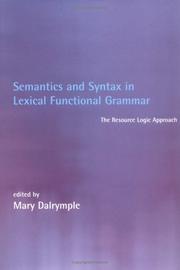
ISBN: 0262041715 0262271176 0585077576 9780262271172 9780585077574 9780262041713 Year: 1999 Publisher: Cambridge, Mass. MIT
Abstract | Keywords | Export | Availability | Bookmark
 Loading...
Loading...Choose an application
- Reference Manager
- EndNote
- RefWorks (Direct export to RefWorks)
Lexicology. Semantics --- Grammar --- Grammar, Comparative and general --- -Lexical-functional grammar --- Semantics --- Formal semantics --- Semasiology --- Semiology (Semantics) --- Comparative linguistics --- Information theory --- Language and languages --- Lexicology --- Meaning (Psychology) --- Generative grammar --- Comparative grammar --- Grammar, Philosophical --- Grammar, Universal --- Philosophical grammar --- Linguistics --- Philology --- Syntax --- Grammar, Comparative --- Lexical-functional grammar --- Languages & Literatures --- Philology & Linguistics --- Lexical-functional grammar. --- Semantics. --- Syntax. --- Grammar, Comparative and general Syntax --- SEMANTIQUE --- Grammaire comparée et générale --- Syntaxe
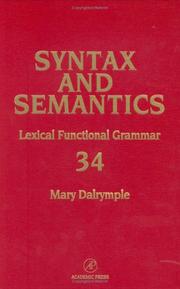
ISBN: 0126135347 0585492212 184950010X 9780585492216 9781849500104 Year: 2001 Volume: 34 Publisher: San Diego, Calif. Academic Press
Abstract | Keywords | Export | Availability | Bookmark
 Loading...
Loading...Choose an application
- Reference Manager
- EndNote
- RefWorks (Direct export to RefWorks)
Volume 34 of Syntax and Semantics is a thorough and accessible overview and introduction to Lexical Functional Grammar (LFG), a theory of the content and representation of different aspects of linguistic structure and the relations that hold between them. The book motivates and describes the two syntactic structures of LFG: surface phrasal organization is represented by a context-free phrase structure tree, and more abstract functional syntactic relations like subject and object are represented separately, at functional structure.The book also presents a theory of semantics and the syntax-semantics interface in which the meaning of an utterance is obtained via deduction from semantic premises contributed by its parts. Clear explication of the formal aspects of the theory is provided throughout, and differences between LFG and other linguistic theories are explored. The theory is illustrated by the analysis of a varied set of linguistic phenomena, including modification, control, anaphora, coordination, and long-distance dependencies. Besides its interest to linguists, LFG also has practical applications in computational linguistics and computer science.This book offers thorough overview of the state of the art in Lexical Functional Grammar. It presents clear explanation of the formal tools of the theory. It also offers introduction to the 'glue' semantics, a theory of the syntax-semantics interface. It also presents in-depth syntactic and semantic analysis of a variety of linguistic constructions.
Grammar, Comparative and general --- Lexical-functional grammar. --- Syntax. --- Lexicology. Semantics --- Grammar --- -Lexical-functional grammar --- Semantics --- Formal semantics --- Semasiology --- Semiology (Semantics) --- Comparative linguistics --- Information theory --- Language and languages --- Lexicology --- Meaning (Psychology) --- Generative grammar --- Comparative grammar --- Grammar, Philosophical --- Grammar, Universal --- Philosophical grammar --- Linguistics --- Philology --- Syntax --- Grammar, Comparative --- Lexical-functional grammar --- Grammaire lexicale fonctionnelle --- Grammar, Comparative and general Syntax --- Semantics.
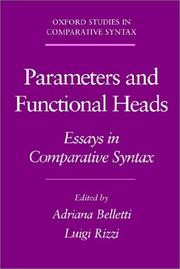
ISBN: 1280442913 1423734823 0195358562 1601299699 9781423734826 9780195087932 0195087933 9780195087949 0195087941 9786610442911 6610442916 0195087933 0195087941 0197722113 Year: 1996 Publisher: New York Oxford University Press
Abstract | Keywords | Export | Availability | Bookmark
 Loading...
Loading...Choose an application
- Reference Manager
- EndNote
- RefWorks (Direct export to RefWorks)
This collection of linguistic essays examines functional heads using the ""principles and parameters"" approach. The main focus is on the general theory of head movement, the properties of derived structures and their parametrization.
Grammar, Comparative and general --- Principles and parameters (Linguistics) --- Lexical-functional grammar. --- Generative grammar --- Language and languages --- Syntax --- Syntax. --- Linguistics --- Philology --- Grammar, Comparative and general Syntax
Book
ISBN: 9027931690 3110838699 9783110838695 9789027931696 Year: 1983 Volume: 21 Publisher: Berlin: Mouton,
Abstract | Keywords | Export | Availability | Bookmark
 Loading...
Loading...Choose an application
- Reference Manager
- EndNote
- RefWorks (Direct export to RefWorks)
No detailed description available for "Lexical-Functional Grammar".
Generative grammar --- Lexical-functional grammar --- Grammaire générative --- Grammaire lexicale fonctionnelle --- Grammar, Generative --- Grammar, Transformational --- Grammar, Transformational generative --- Transformational generative grammar --- Transformational grammar --- Derivation --- Generative grammar. --- Lexical-functional grammar. --- Grammaire générative --- 801.56 --- Grammar, Comparative and general --- 801.56 Syntaxis. Semantiek --- Syntaxis. Semantiek --- Psycholinguistics --- Grammar
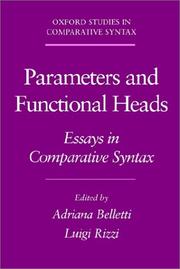
ISBN: 0195087933 0195087941 Year: 1996 Publisher: New York Oxford University Press
Abstract | Keywords | Export | Availability | Bookmark
 Loading...
Loading...Choose an application
- Reference Manager
- EndNote
- RefWorks (Direct export to RefWorks)
Grammar, Comparative and general --- Lexical-functional grammar --- Principles and parameters (Linguistics) --- Syntaxe --- Grammaire lexicale fonctionnelle --- Principes et paramètres (Linguistique) --- Syntax --- Psycholinguistics --- Comparative linguistics --- Grammar --- Generative grammar --- Language and languages --- Lexical-functional grammar. --- Principles and parameters (Linguistics). --- Syntax. --- Linguistics --- Philology --- Grammar, Comparative and general Syntax
Book
ISBN: 9781139224628 113922462X 9781139013574 1139013572 9781139221191 1139221191 9781139218108 1139218107 9781107014176 1107014174 1107229766 1280485280 1139222902 9786613580269 1139215019 Year: 2012 Publisher: New York : Cambridge University Press,
Abstract | Keywords | Export | Availability | Bookmark
 Loading...
Loading...Choose an application
- Reference Manager
- EndNote
- RefWorks (Direct export to RefWorks)
Grammars of natural languages can be expressed as mathematical objects, similar to computer programs. Such a formal presentation of grammars facilitates mathematical reasoning with grammars (and the languages they denote), as well as computational implementation of grammar processors. This book presents one of the most commonly used grammatical formalisms, Unification Grammars, which underlies contemporary linguistic theories such as Lexical-Functional Grammar (LFG) and Head-driven Phrase Structure Grammar (HPSG). The book provides a robust and rigorous exposition of the formalism that is both mathematically well-founded and linguistically motivated. While the material is presented formally, and much of the text is mathematically oriented, a core chapter of the book addresses linguistic applications and the implementation of several linguistic insights in unification grammars. Dozens of examples and numerous exercises (many with solutions) illustrate key points. Graduate students and researchers in both computer science and linguistics will find this book a valuable resource.
Grammar, Comparative and general --- Head-driven phrase structure grammar --- Lexical-functional grammar --- Unification grammar --- HPSG (Linguistics) --- Phrase structure grammar --- Mathematical linguistics --- Generative grammar --- Mathematical models --- Unification --- Lexical-functional grammar. --- Unification grammar. --- Head-driven phrase structure grammar. --- Mathematical models. --- Information Technology --- Computer Science (Hardware & Networks) --- Linguistics --- Philology

ISBN: 9781849500104 184950010X 0126135347 0585492212 9780126135343 9780585492216 Year: 2001 Publisher: San Diego Academic Press.
Abstract | Keywords | Export | Availability | Bookmark
 Loading...
Loading...Choose an application
- Reference Manager
- EndNote
- RefWorks (Direct export to RefWorks)
Volume 34 of Syntax and Semantics is a thorough and accessible overview and introduction to Lexical Functional Grammar (LFG), a theory of the content and representation of different aspects of linguistic structure and the relations that hold between them. The book motivates and describes the two syntactic structures of LFG: surface phrasal organization is represented by a context-free phrase structure tree, and more abstract functional syntactic relations like subject and object are represented separately, at functional structure.The book also presents a theory of semantics and the syntax-semantics interface in which the meaning of an utterance is obtained via deduction from semantic premises contributed by its parts. Clear explication of the formal aspects of the theory is provided throughout, and differences between LFG and other linguistic theories are explored. The theory is illustrated by the analysis of a varied set of linguistic phenomena, including modification, control, anaphora, coordination, and long-distance dependencies. Besides its interest to linguists, LFG also has practical applications in computational linguistics and computer science.This book offers thorough overview of the state of the art in Lexical Functional Grammar. It presents clear explanation of the formal tools of the theory. It also offers introduction to the 'glue' semantics, a theory of the syntax-semantics interface. It also presents in-depth syntactic and semantic analysis of a variety of linguistic constructions.
Lexical-functional grammar. --- Semantics. --- Grammar, Comparative and general --- Grammar, syntax. --- Language Arts & DIsciplines --- Formal semantics --- Semasiology --- Semiology (Semantics) --- Comparative linguistics --- Information theory --- Language and languages --- Lexicology --- Meaning (Psychology) --- Linguistics --- Philology --- Generative grammar --- Syntax. --- Grammar, Comparative and general Syntax --- Syntax
Book
ISBN: 9027270120 9789027270122 1306893437 9781306893435 9789027255990 9027255997 Year: 2014 Publisher: Amsterdam: John Benjamins,
Abstract | Keywords | Export | Availability | Bookmark
 Loading...
Loading...Choose an application
- Reference Manager
- EndNote
- RefWorks (Direct export to RefWorks)
Grammar, Comparative and general --- Minimalist theory (Linguistics) --- Lexical-functional grammar. --- English language --- German language --- Generative grammar --- Language and languages --- Syntax --- Syntax. --- Germanic languages --- Linguistics --- Philology --- Grammar, Comparative and general - Syntax --- Lexical-functional grammar --- English language - Syntax --- German language - Syntax --- Russian language - Syntax --- English language - Grammar, Comparative - German --- English language - Grammar, Comparative - Russian --- Grammar, Comparative and general Syntax --- Russian language --- Minimalist theory (Linguistics). --- Grammar, Comparative --- German. --- Russian.
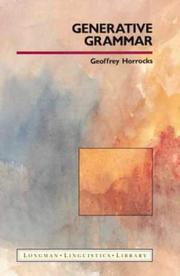
ISBN: 0582291313 0582014735 9780582291317 Year: 1993 Publisher: London: Longman,
Abstract | Keywords | Export | Availability | Bookmark
 Loading...
Loading...Choose an application
- Reference Manager
- EndNote
- RefWorks (Direct export to RefWorks)
#PBIB:gift 2000 --- #PBIB:2000.2 --- Grammar --- Generative grammar --- Government-binding theory (Linguistics) --- Generalized phrase structure grammar --- Lexical-functional grammar --- Generalized phrase structure grammar. --- Generative grammar. --- Government-binding theory (Linguistics). --- Lexical-functional grammar. --- Grammaire générative --- Théorie du liage et du gouvernement (Linguistique) --- Grammaire syntagmatique généralisée --- Grammaire lexicale fonctionnelle --- Binding theory (Linguistics) --- Government and binding (Linguistics) --- Grammar, Comparative and general --- Grammar, Generative --- Grammar, Transformational --- Grammar, Transformational generative --- Transformational generative grammar --- Transformational grammar --- GPSG (Linguistics) --- Derivation --- Linguistics --- Psycholinguistics --- Phrase structure grammar
| Listing 1 - 10 of 13 | << page >> |
Sort by
|

 Search
Search Feedback
Feedback About UniCat
About UniCat  Help
Help News
News